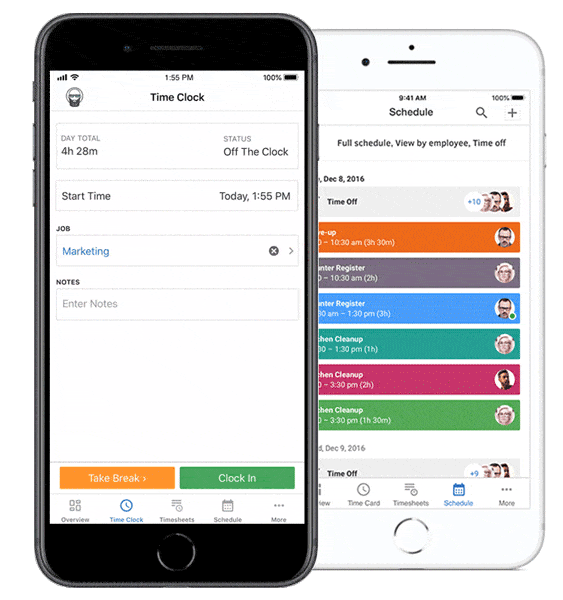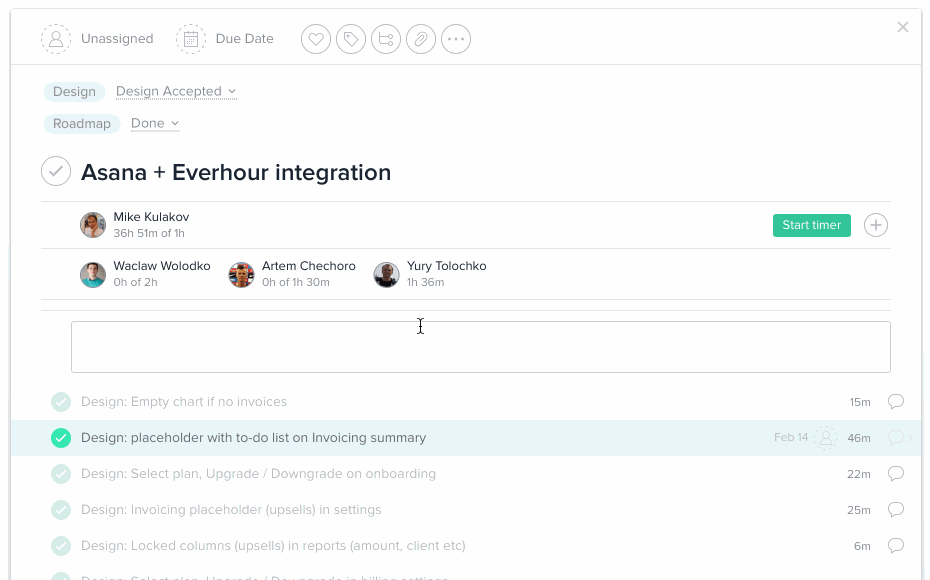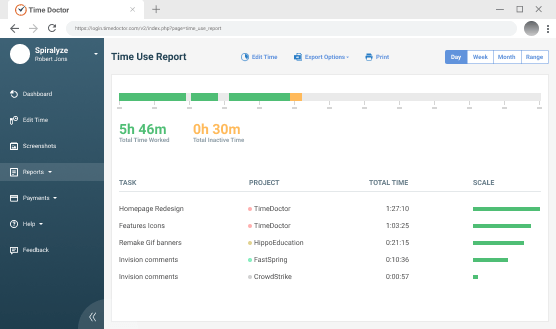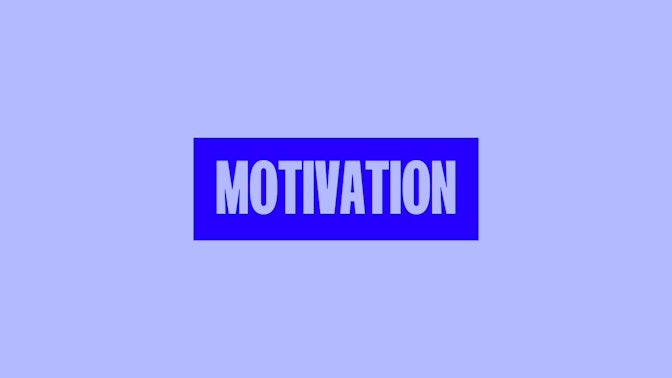Working a standard full-time job has pretty predictable hours: 9-5 with an hour lunch break. But when you start an ecommerce business on the side or to replace your full-time gig, those hours tend to fluctuate.
More than half of small business owners work six days a week, and we’re seeing a shift from the typical 40-hour workweek to 72 hours. (Whoa!)
But as the saying goes, you can work smarter, not harder. One study found that business owners and executives spend nearly a third of their week on menial, unnecessary tasks. And another survey saw that 62 percent of manufacturers still use old-school pen and paper to track their processes.
It’s 2019. We’re in the world of automation, technology, and efficiency.
Where are you spending all of your time?
Rather than manually recording how many hours and minutes you spend on each task in your biz, you can use a time tracking app to do it for you. Below, we round up ten of the best, plus some honorable mentions in case these aren’t the right fit for you.
Post Contents



10 Best Time Tracking Apps
- Toggl
- Harvest
- Hubstaff
- TSheets
- Everhour
- Timely
- Time Doctor
- TrackingTime
- ZoomShift
- FreshBooks
| Tool | Pricing | Platforms | Integrations | Unique/Best Feature |
| Toggl | Free up to 5 users (limited features); $10/month/user (starter); $20/month/user (premium) | iOS, Android, Mac, Windows, Linux, Chrome, Firefox | 100+ | Unlimited clients, projects, and reports (even for free users) |
| Harvest | Free for one user, up to two projects; $12/month/user | iOS, Android, Mac, Windows, Chrome, Safari | 80+ | Automated invoicing and billing |
| Hubstaff | Free for one user (limited features); $5/month for one user (basic); | iOS, Android, Mac, Windows, Linux, Chrome | 31 | Employee activity and productivity tracking |
| TSheets | Free (limited features); $5/month/user | iOS, Android, Mac, Windows, Chrome | 36 | GPS tracking |
| Everhour | $8/month for one user; $7/month/user for teams | iOS, Chrome, Firefox | 15 | Seamless integrations |
| Timely | Starts at $8/month for one user | iOS, Android, Mac, Windows | 100+ | A massive list of integrations across all kinds of platforms and tools |
| Time Doctor | $9.99/user/month | iOS, Android, Mac, Windows, Linux, Chrome | 35 | Tackles productivity challenges |
| TrackingTime | Free up to three users; $4.99/user/month | iOS, Android, Mac, WIndows, Chrome, Firefox | 31 | Project management with built-in time tracking |
| ZoomShift | Free; $4/month per member (premium); custom (negotiated) | iOS, Android | 50+ | Lighting-quick work schedules and reduced payroll costs |
| FreshBooks | $15/month for five billable clients; $25/month for 50; $50/month for 500 | iOS, Android, Chrome | 80+ | Tightly integrated with billing, invoicing, and other accounting features |
1. Toggl
Capterra: 4.5/5⭐
G2 Crowd: 4.3/5⭐
→ Click Here to Launch Your Online Business with Shopify
Software Advice: 4.58/5⭐
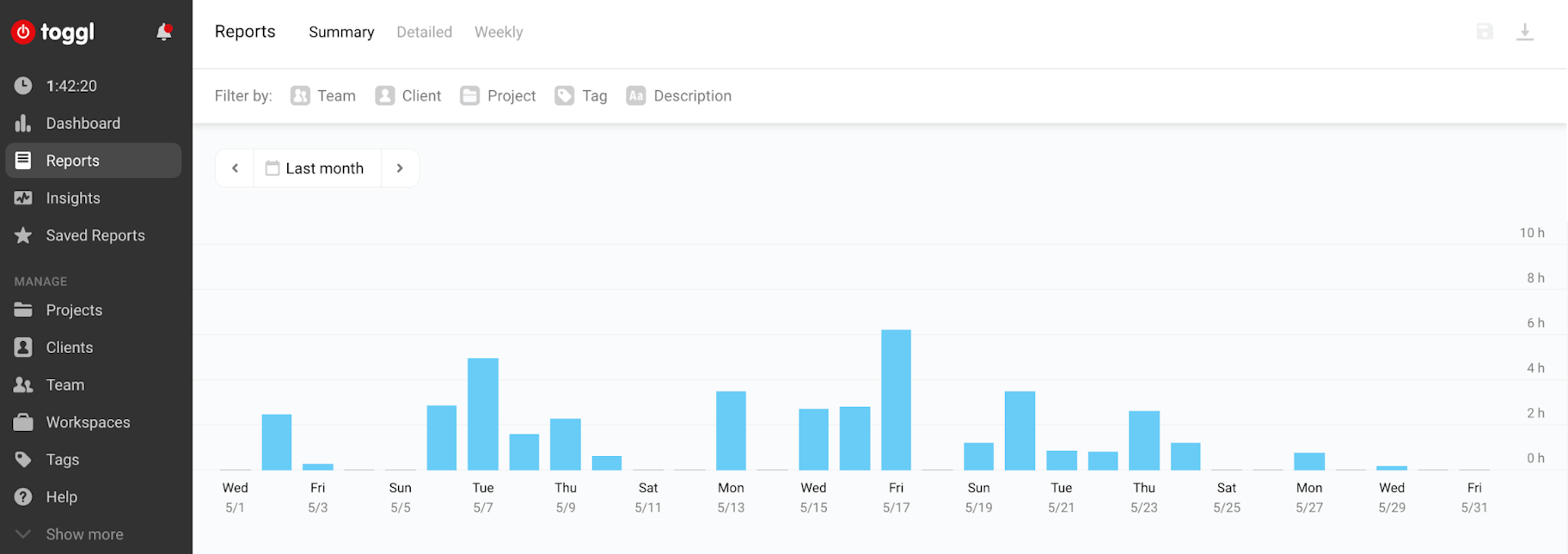
It integrates with more than 100 other tools like Basecamp, Google Drive, and Jira. I tried to use the Asana integration, but because the client/project in Toggl doesn’t line up to how my Asana projects are set up, the integration hasn’t worked well for me.
You can also download the Chrome and Firefox extensions (I like that I get a little notification reminding me to track my time if I haven’t started the timer), and there are also Toggl apps for iOS, Android, and desktop. No connection, no problem — use Toggl offline, and it’ll sync up the next time you’re online.
Paid users get deeper insights to see which projects and employees require the most time so you can see who generates the most revenue.
One downside for me is that Toggl’s paid plans are charged per user. So, if you expect your team to grow significantly, so will your Toggl expenses.
2. Harvest
Capterra: 4.5⭐
G2 Crowd: 4.3⭐
Software Advice: 4.51⭐
Harvest is another go-to, time tracking leader. Like Toggl, there is a free plan, but this limits you to just one user and two projects. On the flipside, you also get tons of integration options across project management, accounting, CRM, and other tools.
Plus, there are mobile time keeping apps for both iOS and Android, and Chrome and Safari extensions. Or you can just stick to the desktop version.
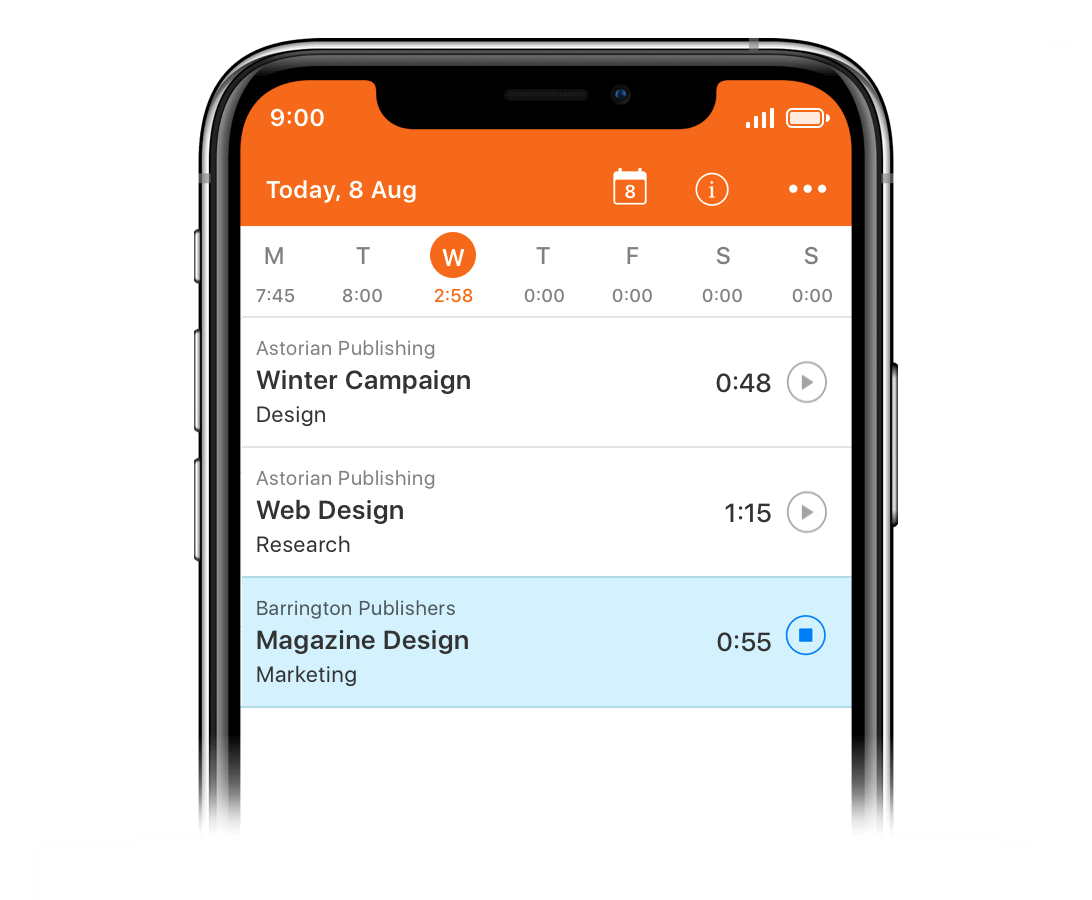
3. Hubstaff
Capterra: 4.5⭐
G2 Crowd: 4.4⭐
Software Advice: 4.6⭐
Next on the list is Hubstaff, a time management app meant for employers to keep track of team members’ productivity. If you’re flying solo, you can use the time keeping app for free, though this comes with a short list of features.
In a nutshell, Hubstaff helps you make sure your team is using their time wisely. Getting started is easy, and you can quickly integrate it with more than 30 other tools to help manage teams and workflows.
Here’s Hubstaff’s bread and butter: making sure you and your team is reaching their potential, at least in a time management sense. It’ll detect when a user has been idle (a.k.a. not working) for too long and ping you when that’s the case – prompting you to get back on track or stop the timer and edit your entry.
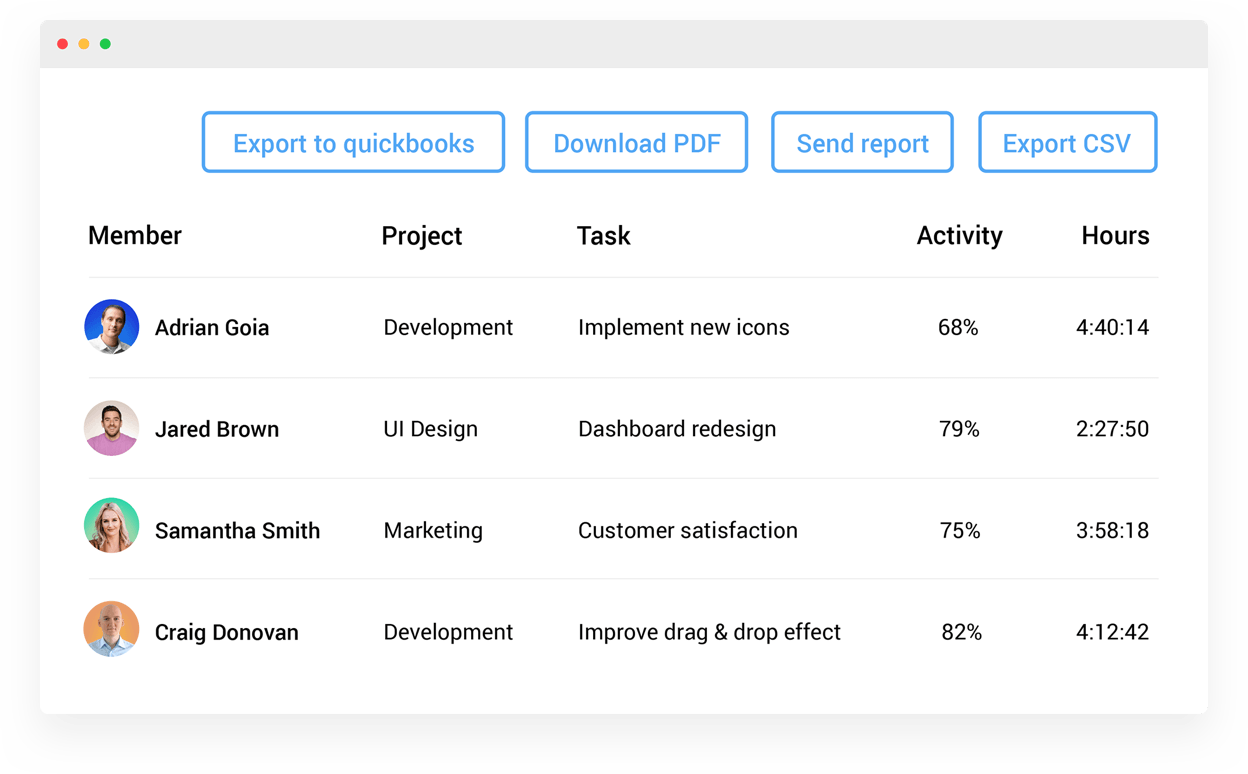
It manages payroll and invoicing, so those tedious financial tasks aren’t as time-consuming as before. And 24/7 customer support is there for you on those sleepless nights (we’ve all been there).
Keep in mind, users have reported some random buggy issues with the tool, but nothing problematic enough to seriously deter them from migrating over to another tool.
4. TSheets
Capterra: 4.5⭐
G2 Crowd: 4.7⭐
Software Advice: 4.74⭐
Solopreneurs, listen up: TSheets is one of the best timesheet apps out there. The free version is only available for one user, but you get access to all the goodies, unlike many other free time trackers. That includes detailed reports, customer support, and payroll and invoicing.
Not flying solo? You can add team members, and TSheets will notify them when you’ve created a new schedule or updated an existing one. Copy previous schedules, so you don’t have to start from scratch.
The tool is owned and managed by Quickbooks, which means that integration is pretty seamless and robust.
Beyond that, TSheets also can be a bit invasive, though not as much as Hubstaff. You can set geofencing parameters, so team members can only track time when they’re within bounds. GPS tracking also ensures everyone is where they’re supposed to be, doing what they’re supposed to be doing.
5. Everhour
Capterra: 4.5⭐
G2 Crowd: 4.7⭐
Software Advice: 4.67⭐
Everhour is another time tracker aimed at freelancers and businesses who bill clients hourly. It’s super simple to get up and running, and they also work to continually make small improvements to the tool without sacrificing intuitiveness. Though its list of integrations is smaller than most, reviewers love how well it integrates with Trello and Asana.
Many compare Everhour to Toggl, thanks to its simple interface and reporting capabilities. And Everhour’s Asana integrations are said to be seamless.
It’ll tell you how profitable you are in a given time period, using data from billable hours and contractor pay rates.
In terms of resource planning, Everhour will allow you to allocate how many hours a project should take and alert you when you’re nearing that threshold.
6. Timely
Capterra: 4.5⭐
G2 Crowd: 4.5⭐
Software Advice: 4.69⭐
Automation is the key for Timely, an app “meticulously designed by vikings” from Norway. All jokes aside, Timely is unique in that, when you get started, everything is manual. But after about a week, it learns your time tracking habits and automates much of the process. It’ll learn about your working habits, group time entries into projects, and reminds you when you’ve been inactive after some time.
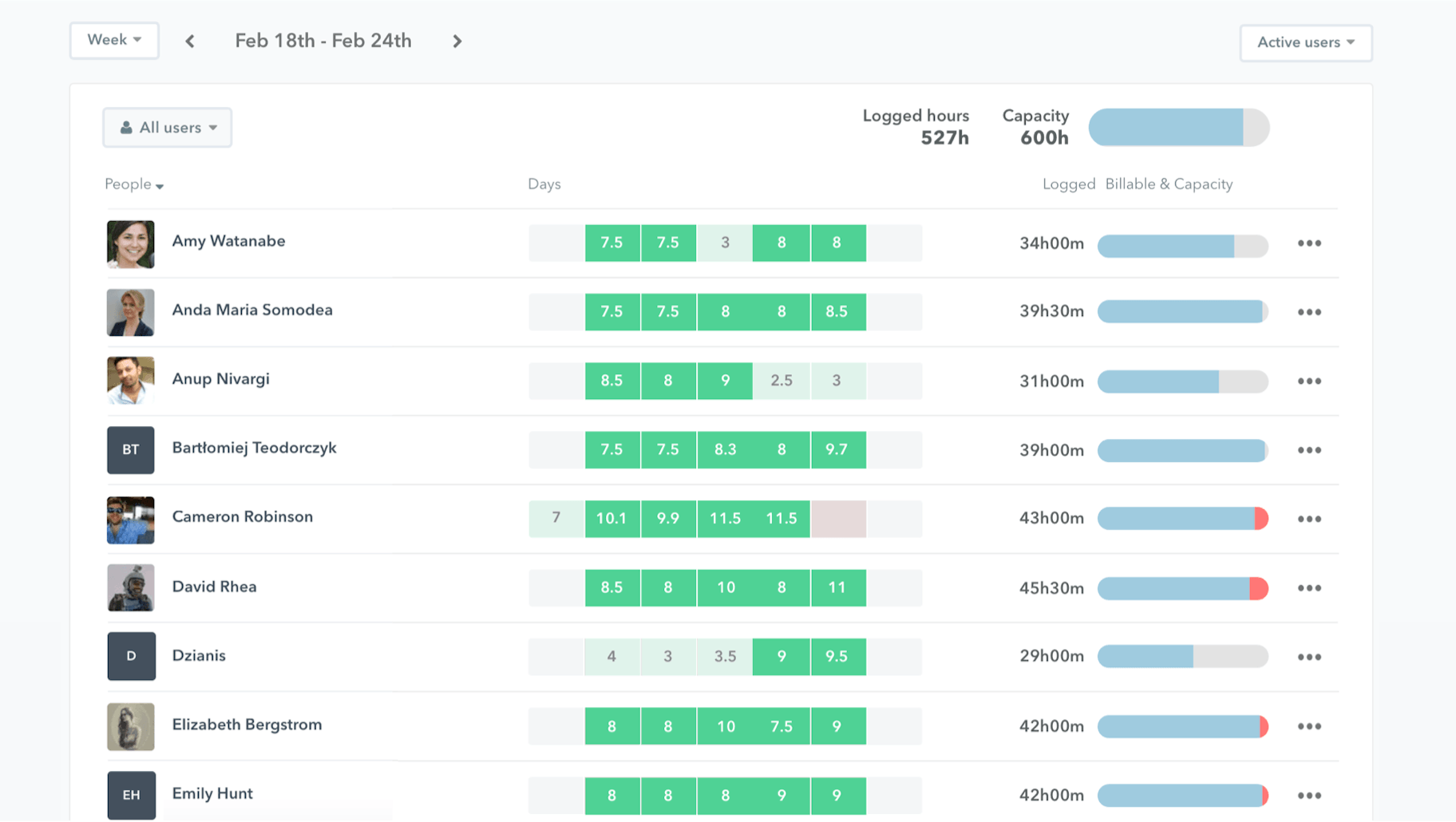
Plus, Timely has robust reporting features that can help you allocate resources more effectively. It’s not cheap, but it is powerful.
7. Time Doctor
Capterra: 4.5⭐
G2 Crowd: 4.3⭐
Software Advice: 4.54⭐
If your team’s productivity isn’t up to par or you simply want to keep a closer eye on their workload, Time Doctor is the remedy for you. Time Doctor actually ups the ante and gives Hubstaff a run for its money.
The tool will take screenshots of your team’s monitors, so you can see what they’re up to, plus it’ll monitor any chats they’re having within the app. If someone’s spending too much time scrolling through Facebook, Time Doctor won’t let them get away with it and will send an alert anytime you veer off track.
Care to give your clients a peek? Share a client view so they can check in. (Don’t worry, this isn’t mandatory.)
Time Doctor doesn’t just track how much time people are spending not working, though. It also looks at how much time is spent on each project, as well as outside programs and apps.
The integrations are focused on project management, so it’s a great tool to make sure everyone stays the course.
8. TrackingTime
Capterra: 4.5⭐
G2 Crowd: 4.3⭐
Software Advice: 4.33⭐
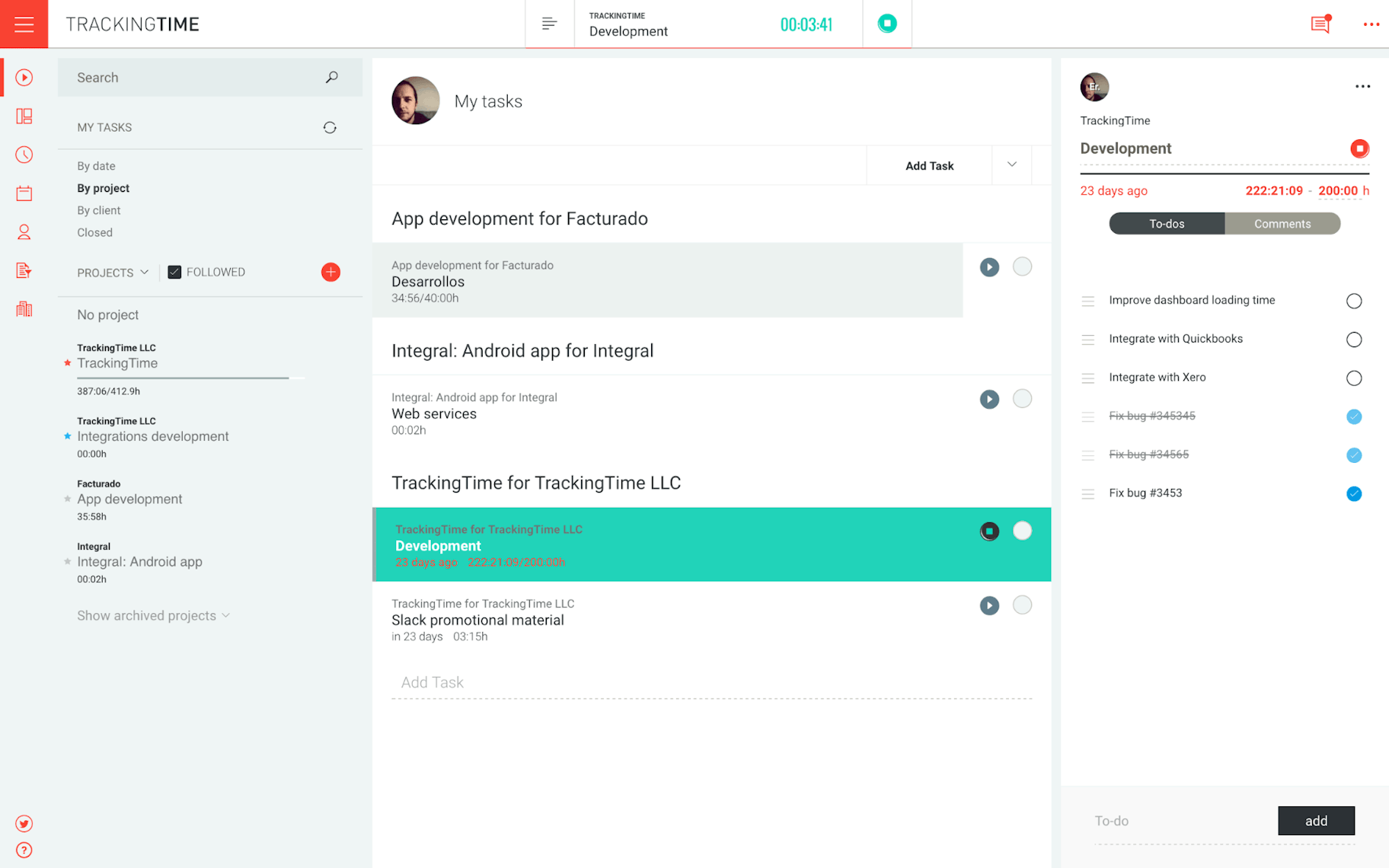
Some of the biggest benefits of TrackingTime are its detailed reporting – check out spent time on what and which clients or projects took the most time.
Because TrackingTime really hangs its hat on project management, you might run into issues tracking time for tasks not directly associated with a task. So, if you want to know how much time you’ve spent on email, this isn’t the tool for you.
9. ZoomShift
Capterra: 4.5⭐
G2 Crowd: 4.8⭐
Software Advice: N/A⭐
ZoomShift is employee scheduling software that offers a unique time tracking tool that puts you in control of employee timesheets. It allows for better time management so that milestones can be easily viewed and client expectations can be better managed. Employees can clock in for assigned shifts using the web time clock or mobile time clock and management can edit timesheets on the fly from the free iOS and Android apps.
Time tracking errors can kill your bottom line. Missed deadlines, early and late punches, extra unscheduled shifts. You can lose hundreds of dollars a month if you’re not careful. ZoomShift can help prevent these errors from happening and block employees from clocking in without being scheduled. Plus, the app communication features allows for real-time discussion between team members to increase productivity, and improve the quality of work.
10. FreshBooks
Capterra: 4.5⭐
G2 Crowd: 4.6⭐
Software Advice: 4.47⭐
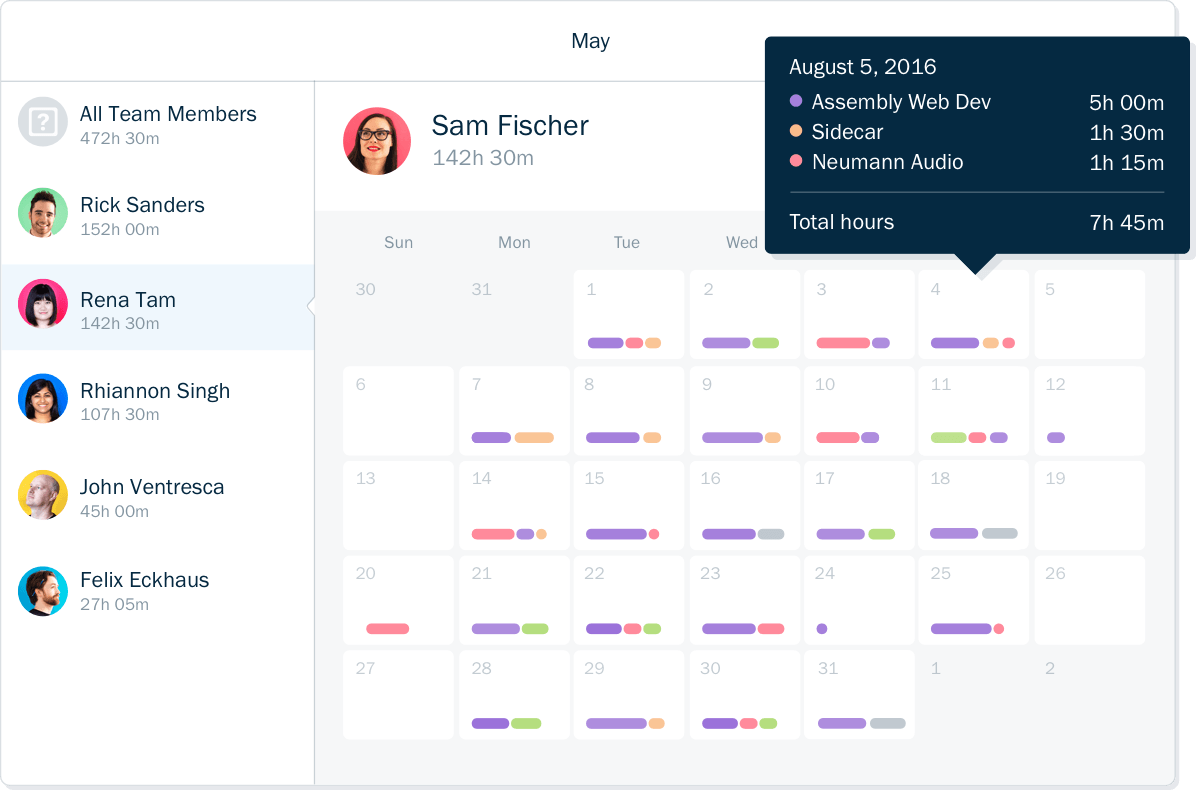
As far as time tracking goes, FreshBooks will also give you a breakdown of hours, the option to add team members, and the option to add notes to each entry, which you can refer to later. If you’re already using FreshBooks, it’s a no-brainer.
Honorable Mentions
You can Google “time tracking app” and come up with literally thousands of options. If none of the time logging apps listed above strike your fancy, check out some of these alternatives:
- Jibble: time and attendance tracker for teams
- HourStack: time tracking, planning, and reporting
- OfficeTime: time and expense tracking
- RescueTime: productivity tracking
- Timeneye: time tracking and project management
- TMetric: free, simple time tracking
- All Hours: attendance and hours tracker for teams
- Tick: time tracking for profitability
Summary
When it comes down to identifying the best time tracking app, there really is no one answer. Every business owner has different challenges and needs, and it all boils down to which tool can fulfill those needs best.
Some of the options listed above are focused solely on time tracking, while others also dip into project management, invoicing, payroll, and other areas of business operations.
Every busy entrepreneur needs to find tools that fit within their ecosystem and make things run more smoothly. Consider your pain points and evaluate your options based on where you are now and where you want your business to be in the future.




